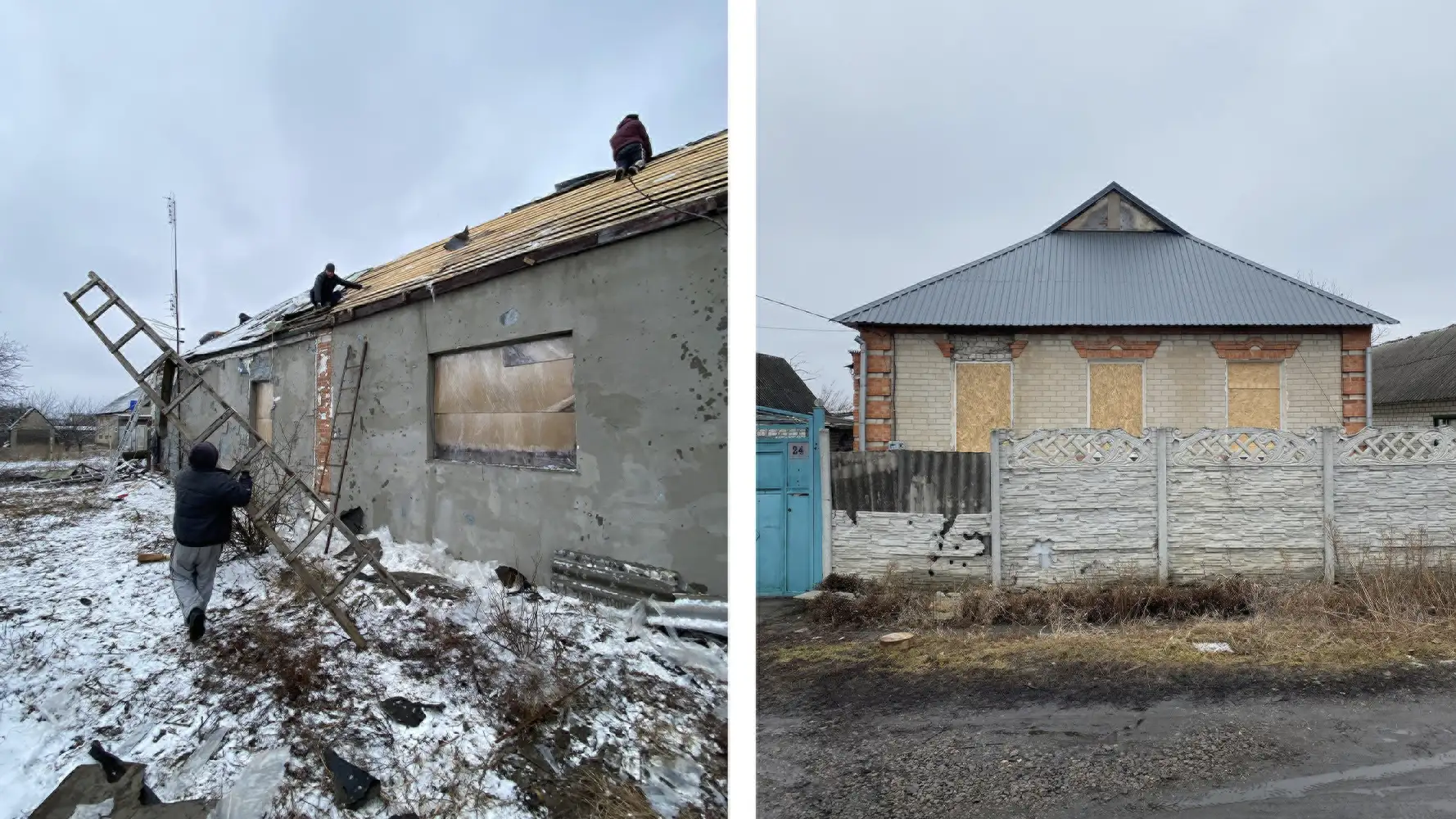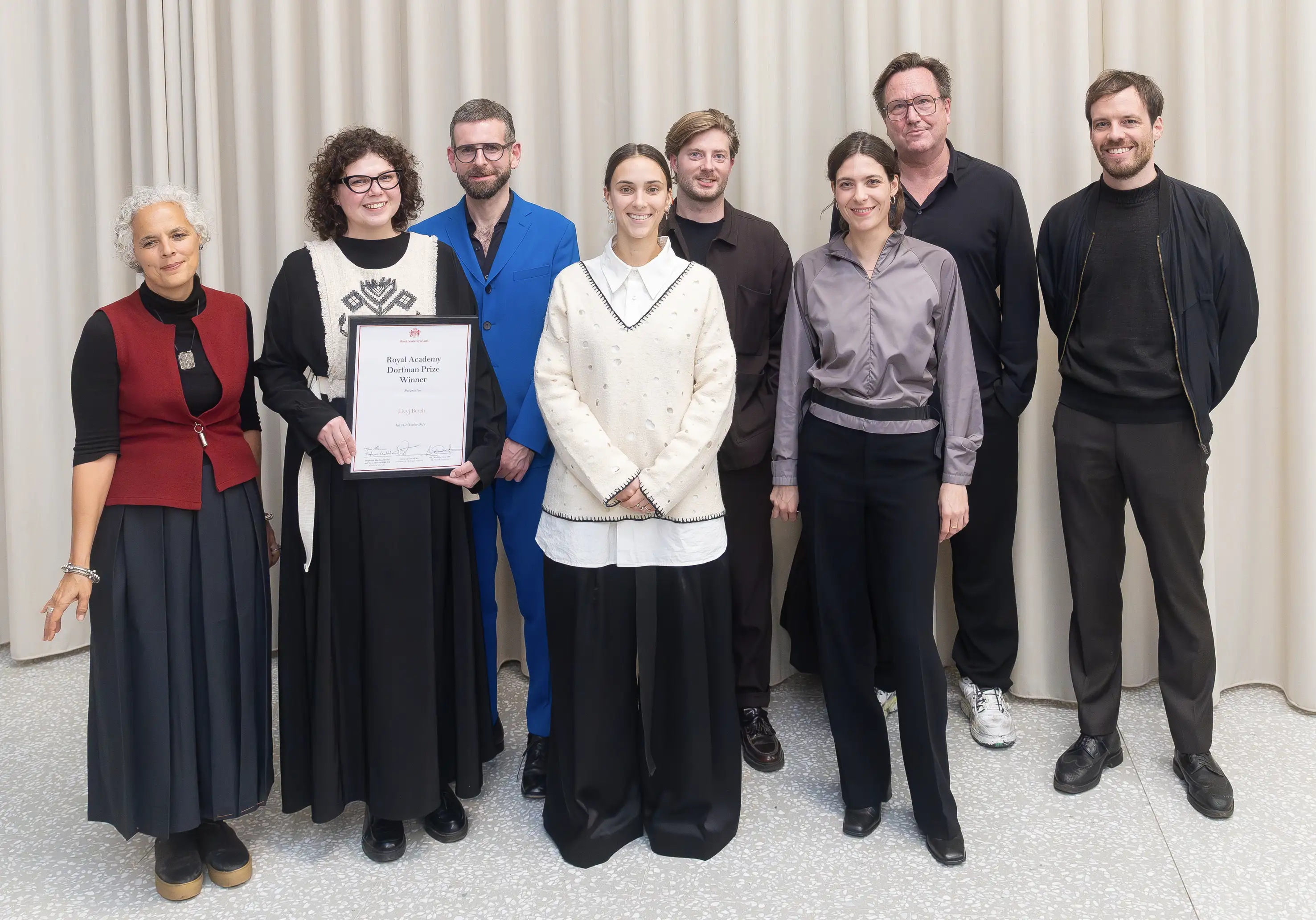A Ukrainian collective dedicated to repairing buildings damaged in the war with Russia has won the 2024 Royal Academy Dorfman Prize. At a ceremony held in London last week, the Kyiv-based volunteer group, Livyj Bereh, was given first place in a prize that celebrates new ideas shaping the future of architecture for its work restoring the roofs of houses in the Černihiv, Kyiv, and Charkiv regions.
To date, the organization has restored 380 roofs in the war zone, all in a uniform, profiled metal. “We realized that roofs are the greatest problem with a damaged building, because if the roof goes then the rest of the building goes quickly after,” said Kseniia Kalmus, co-founder of Livyj Bereh, in her pre-award presentation. Each sloping roof costs on average about $2,200. Dorfman Prize jury chairs Tom Emerson and Stephanie Macdonald of British firm 6a architects said: “Their use of modest black corrugated metal roofs produces an architectural act of collective care and resistance across the country, as powerful as any civic monument and documented with the unflinching eye of the greatest war art.”

Photos courtesy Livyj Bereh
Of Livyj Bereh’s founders, only Vlad Sharapa worked in construction prior to the Russian invasion of Ukraine in February 2022. Ihor Okuniev was a graphic designer and Kalmus was an award-winning florist who closed her shop on the day that the bombs first fell on Kyiv. She met Sharapa and Okuniev working with food-delivery programs early in the war and they began fixing roofs later that year. She was the only member of the collective able to attend the award ceremony in-person as Ukrainian laws prevent men of conscription age from traveling.

The assembled finalists for the 2024 Royal Academy Dorfman Prize at the Royal Academy in London. Kseniia Kalmus of Livyj Bereh is joined by members of b+ (Germany), TEN (Switzerland and Serbia), and Salima Naji (Morocco). Photo by Benedict Johnson
.webp)
Photo courtesy Livyj Bereh
While highly specialized, the work of Livyj Bereh exemplified wider trends across this year’s award program. “The shortlisted practices all offered different approaches to repair and to collective action,” said Emerson in his citation. Berlin-based studio b+ explores numerous ways of encouraging building reuse, including an organized political campaign to create legislation at a European level that encourages renovation instead of demolition. Meanwhile, TEN, a Zurich- and Belgrade-based collective, uses lightweight construction technologies to make nimble social interventions, such as its housing project for single, socially disadvantaged women in Bosnia completed in 2021. Lastly, shortlisted architect Salima Naji’s studio has rebuilt 30 earth and stone buildings across southern Morocco as social infrastructure and is currently leading the reconstruction of the earthquake damaged, 16th-century fort Agadir Oufella, one of Morocco's most important landmarks.
However, it was Livyj Bereh— the name means “left bank” in Ukrainian, in reference to the territories under attack by Russia to the east of the Dnieper River—that ultimately took home the prestigious, roughly $13,000 prize for emerging practices. The prize is named after the Dorfman Foundation, a founding partner of the Royal Academy of Arts’ now 6-year-old architecture award program.
In addition to dealing with the pressing condition of war damage, the collective is also committed to highlighting the consequences of the war on architecture. At a 2022 art show held in Germany meant to demonstrate Europe-wide solidarity with Ukraine, Livyj Bereh presented a temporary house containing a small exhibition of the condition in which they work. The house was then shipped to Ukraine to become a new home for a family in the Kyiv region, whose prior residence was destroyed by a Russian tank. Documentation of the project was presented at the 2023 Venice Architecture Biennale and the Constructing Hope: Ukraine exhibition at the Center for Architecture in New York earlier this year.

Kseniia Kalmus presents the work of Livyj Bereh. Photo by Benedict Johnson
Kulmar explained to RECORD how much the Dorfman Prize means to the practice: “We work in the field all the time and have been going from one project to the next so we don't feel how much we do,” she said. “It was only during making our shortlist presentation that we understood.” Architecture though is only part of Livjy Bereh’s remit as they also repair vehicles and infrastructure. During her visit to London for the award ceremony, Kulmar promoted the collective’s side-venture, a crowdfunding platform for drone production.
Kulmar and her colleagues join recent Royal Academy Dorfman Prize honorees including Mexico’s Taller Gabriela Carrillo (2023) and Vinu Daniel of India (2022).




